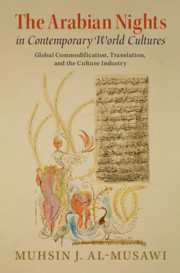 The Arabian Nights in Contemporary World Cultures
The Arabian Nights in Contemporary World Cultures Book contents
- The Arabian Nights in Contemporary World Cultures
- Frontispiece
- The Arabian Nights in Contemporary World Cultures
- Copyright page
- Dedication
- Contents
- Figures
- Acknowledgments
- Introduction
- 1 The Arabian Nights
- 2 The Scheherazade Factor
- 3 Engagements in Narrative
- 4 The “Hostile Dynasty”
- 5 The Archaeology of A Thousand and One Nights
- 6 Signatures and Affiliates
- 7 Decolonizing the Arabian Nights?
- 8 Invitation to Discourse
- Book part
- Select Bibliography
- Index
7 - Decolonizing the Arabian Nights?
Published online by Cambridge University Press: 17 August 2021
- The Arabian Nights in Contemporary World Cultures
- Frontispiece
- The Arabian Nights in Contemporary World Cultures
- Copyright page
- Dedication
- Contents
- Figures
- Acknowledgments
- Introduction
- 1 The Arabian Nights
- 2 The Scheherazade Factor
- 3 Engagements in Narrative
- 4 The “Hostile Dynasty”
- 5 The Archaeology of A Thousand and One Nights
- 6 Signatures and Affiliates
- 7 Decolonizing the Arabian Nights?
- 8 Invitation to Discourse
- Book part
- Select Bibliography
- Index
Summary
Chapter 7 throws us headlong into a controversial issue that reflects on the first chapter, but also complements every other chapter in that it takes the “Oriental mode” as a problematic that invites deconstruction. Does the connotation of the mode signify the anxieties of the pillars of the Enlightenment? It certainly does, and hence the need to work out an emancipatory discourse from a ruling Western rationality that presents everything, even the theory of the novel or narratology as necessarily Western. The role of philologists since the early nineteenth century in relation to the production of knowledge is more relevant to the study and vogue of the Nights than has been hitherto noticed. Scheherazade’s body, the matter and manner of the Nights is no less the crux of discussion than the visible grouping of language in families, Aryan and Semite. This is why many twentieth-century experimentations are to be read as decolonizing in that they redirect attention to a literary text, not a document.
- Type
- Chapter
- Information
- The Arabian Nights in Contemporary World CulturesGlobal Commodification, Translation, and the Culture Industry, pp. 253 - 280Publisher: Cambridge University PressPrint publication year: 2021
